Chipmunk comes up and takes food from his hand
Chipmunks are a genus of rodents from the squirrel family. Chipmunks include 25 species, most of which live in North America, with the exception of one Eurasian species - the Asian, or Siberian, chipmunk.
A distinctive feature of all species is five dark stripes along the back, which are separated by white or gray stripes.
The chipmunk, like the squirrel, is a tree dweller. He does not necessarily need tall old trees, sometimes he is content with thickets of bird cherry, birch or willow.
It does not live in open places and in a clean high-stemmed forest without undergrowth from young growth and shrubs. Prefers places littered with windbreak and deadwood along the banks of rivers and streams.
In the hole, which is sometimes quite long - up to 3 meters, in addition to the chamber for the nest, there are always 1 or 2 large storerooms for supplies and 1-2 dead ends - toilets.
The living area is lined with dry grass and leaves.
For the winter, chipmunks hibernate. They wake up in the middle of winter, get some food, and then go back to sleep.
The winter stocks of the animal are also very interestingly different from the stocks of other animals.
Its pantries are filled with a wide variety of products: here and wheat, and oats, and buckwheat, and flax, and sunflower, and various wild seeds, and acorns, and nuts, and dried berries, and apples, and even mushrooms.
At the same time, different products are never mixed, since the animal lays them out neatly in separate piles on a bed of dry grass. The amount of stocks in the burrow of a chipmunk, according to accurate data, reaches 6 kilograms.
Fun fact: A chipmunk can put up to ten nuts in its mouth at a time.
The main natural enemies of chipmunks are small animals of prey and birds of prey.
Occasionally they are pursued by such large predators as the bear, which seeks to dig out the chipmunk's mink in search of its winter food reserves.
A chipmunk pursued by a predator never runs to hide in a hole so as not to give the enemy the location of the dwelling.
He usually hides in a windbreak or in trees.
When people or dogs approach, chipmunks emit abrupt "hitching" or whistle.
-
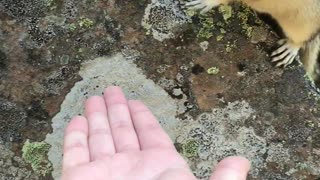 0:10
0:10
ViralHog
2 years agoWild Chipmunk Eats Food From Hand
183 -
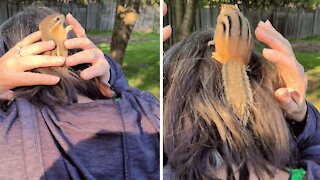 0:24
0:24
perianderson
3 years ago $9.23 earnedChipmunk rescued from cat takes refuge in woman's hair
7.82K29 -
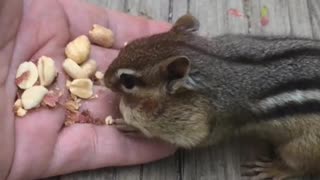 1:05
1:05
My Videos
3 years ago $0.01 earnedChipmunk Eating from a Hand
13425 -
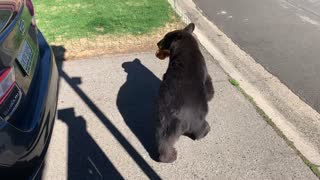 0:20
0:20
ViralHog
2 years ago $0.16 earnedBlack Bear Casually Takes Food From Garage
4.09K2 -
 1:11
1:11
The Post Millennial Live
2 years agoBiden actually takes questions from reporters
1.74K6 -
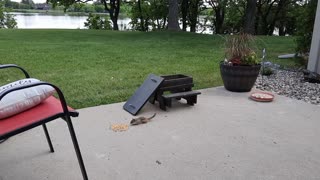 0:58
0:58
lonoshana
3 years agoChippy takes his food
5 -
 1:19:23
1:19:23
Mally_Mouse
8 hours agoLet's Hang - Cosplay Stream!!
46.8K2 -
 1:05:06
1:05:06
Lou Dobbs
14 hours agoLou Dobbs Tonight 5-31-2024
62.4K35 -
 1:42:57
1:42:57
The Quartering
15 hours agoDonald Trump Conviction BACKFIRES, Massive Funds Raised, Democrats Swap Parties & More
99K95 -
 26:11
26:11
Stephen Gardner
13 hours ago🔴HUGE TRUMP WIN! Biden, Hillary, Obama ALL IN BIG TROUBLE NOW!!
92.5K382